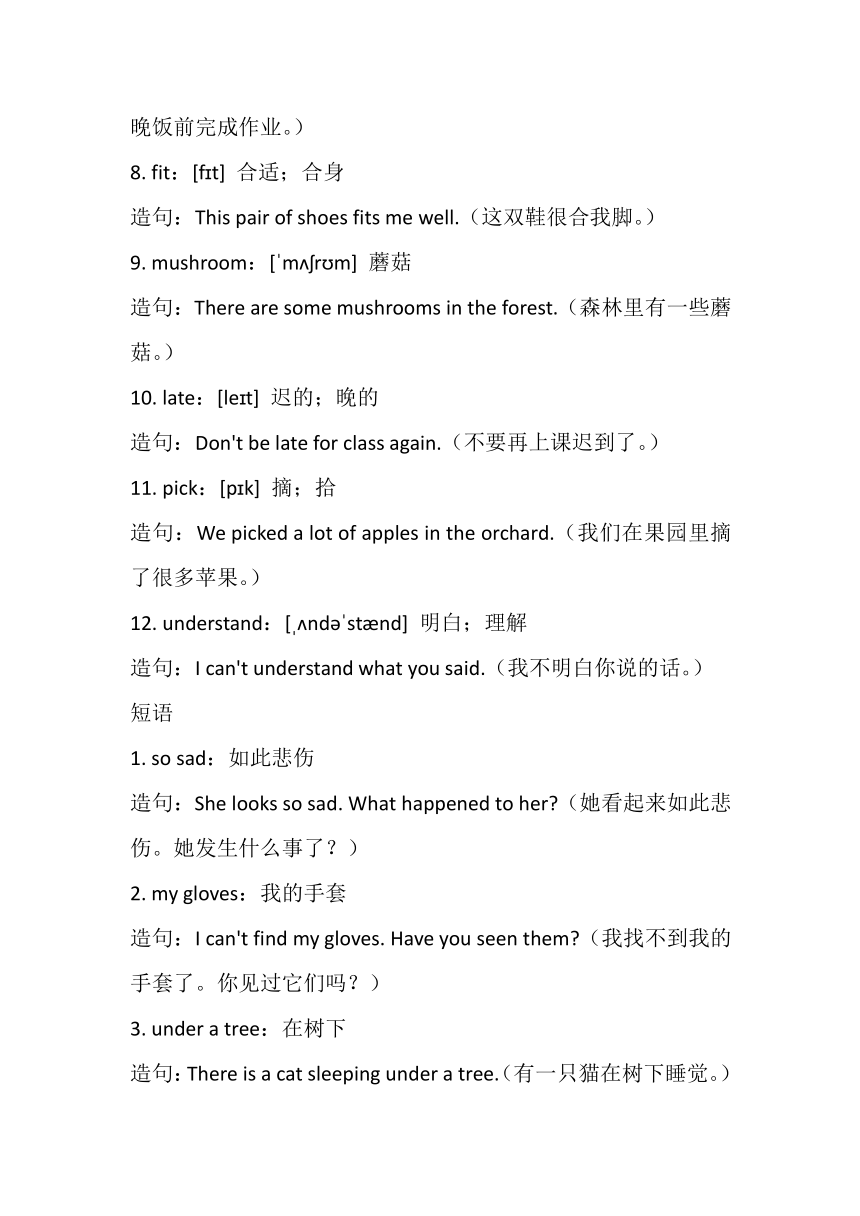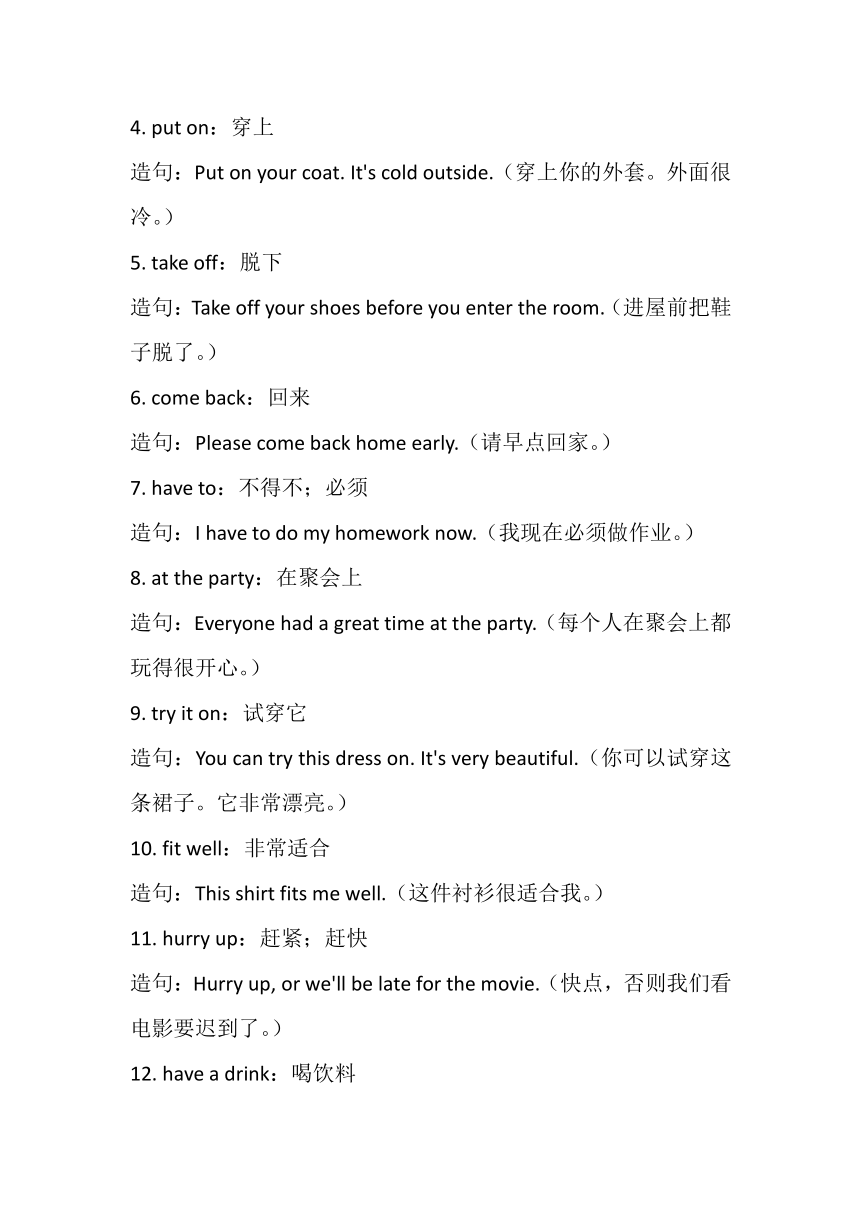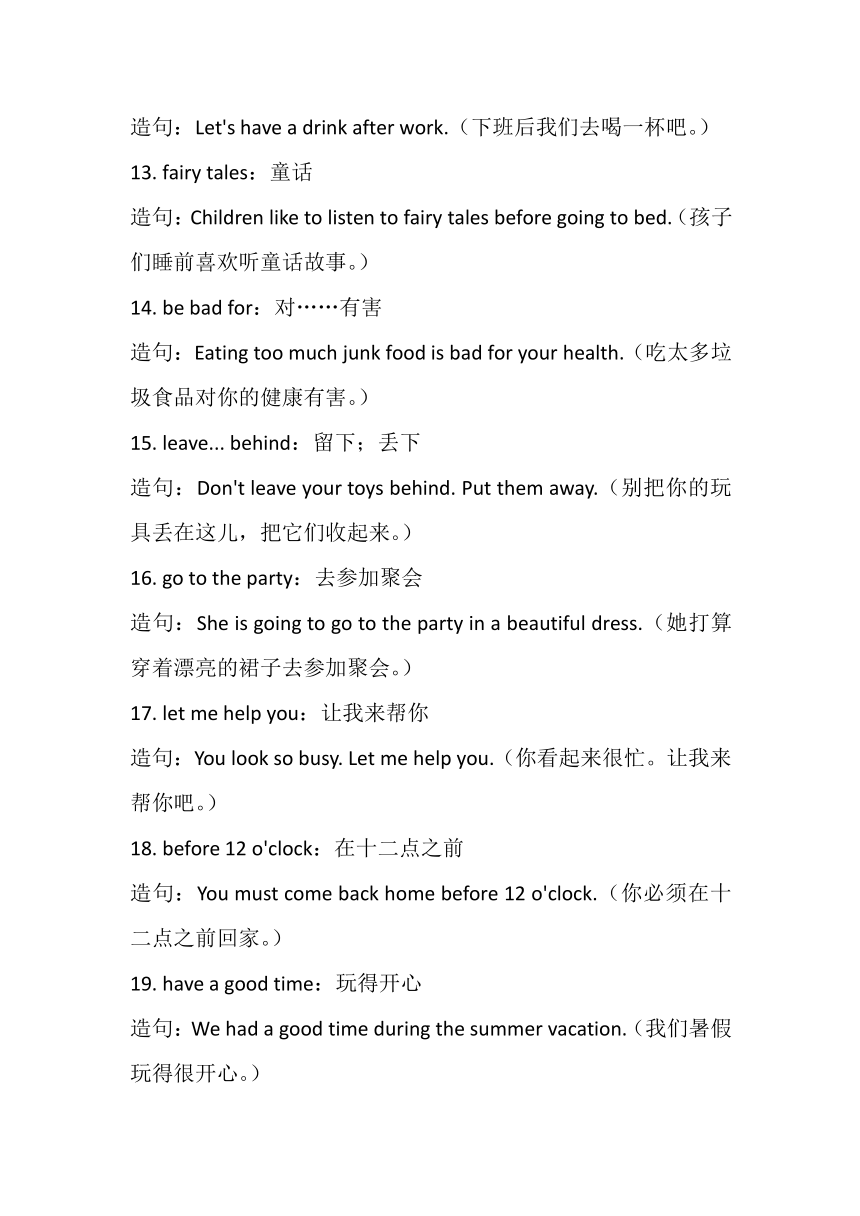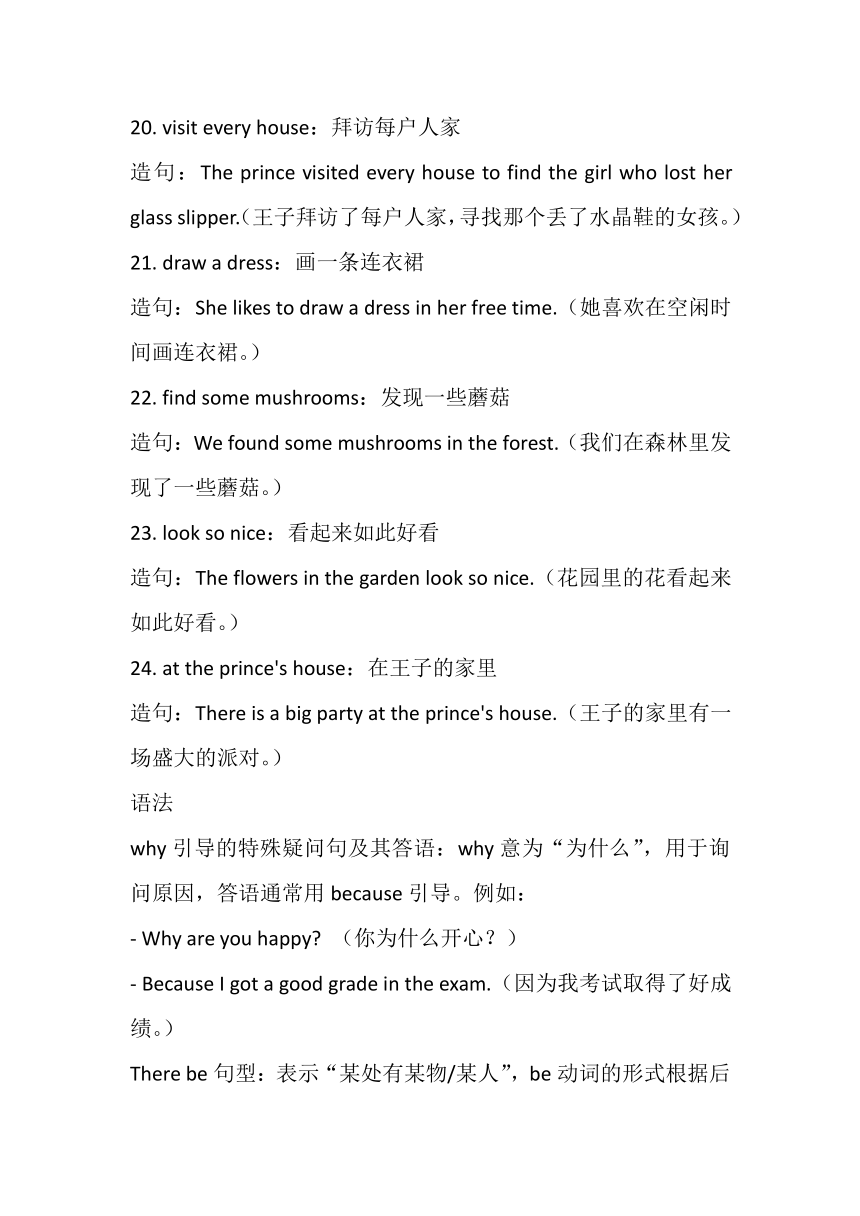Unit1-Unit2知识清单-2024-2025学年译林版(三起)英语五年级下册
文档属性
| 名称 | Unit1-Unit2知识清单-2024-2025学年译林版(三起)英语五年级下册 |  | |
| 格式 | docx | ||
| 文件大小 | 24.1KB | ||
| 资源类型 | 教案 | ||
| 版本资源 | 牛津译林版 | ||
| 科目 | 英语 | ||
| 更新时间 | 2025-02-09 12:35:48 | ||
图片预览





文档简介
Unit1-2(知识清单)-2024-2025学年译林版(三起)英语五年级下册
Unit1 Cinderella
词汇
1. why:[wa ] 为什么
造句:Why are you late for school today (你今天为什么上学迟到了?)
2. because:[b k z] 因为
造句:I didn't go to the park because it rained heavily.(因为雨下得很大,所以我没去公园。)
3. clothes:[kl z] 衣服(复数形式,无单数形式)
造句:These clothes are very beautiful.(这些衣服非常漂亮。)
4. let:[let] 让
造句:Let's go to the cinema together.(让我们一起去看电影吧。)
5. prince:[pr ns] 王子
造句:The prince saved the princess from the tower.(王子从塔里救出了公主。)
6. fairy:[ fe ri] 仙女;小精灵
造句:The fairy gave Cinderella a beautiful dress.(仙女给了灰姑娘一条漂亮的裙子。)
7. before:[b f (r)] 在……以前
造句:You should finish your homework before dinner.(你应该在晚饭前完成作业。)
8. fit:[f t] 合适;合身
造句:This pair of shoes fits me well.(这双鞋很合我脚。)
9. mushroom:[ m r m] 蘑菇
造句:There are some mushrooms in the forest.(森林里有一些蘑菇。)
10. late:[le t] 迟的;晚的
造句:Don't be late for class again.(不要再上课迟到了。)
11. pick:[p k] 摘;拾
造句:We picked a lot of apples in the orchard.(我们在果园里摘了很多苹果。)
12. understand:[ nd st nd] 明白;理解
造句:I can't understand what you said.(我不明白你说的话。)
短语
1. so sad:如此悲伤
造句:She looks so sad. What happened to her (她看起来如此悲伤。她发生什么事了?)
2. my gloves:我的手套
造句:I can't find my gloves. Have you seen them (我找不到我的手套了。你见过它们吗?)
3. under a tree:在树下
造句:There is a cat sleeping under a tree.(有一只猫在树下睡觉。)
4. put on:穿上
造句:Put on your coat. It's cold outside.(穿上你的外套。外面很冷。)
5. take off:脱下
造句:Take off your shoes before you enter the room.(进屋前把鞋子脱了。)
6. come back:回来
造句:Please come back home early.(请早点回家。)
7. have to:不得不;必须
造句:I have to do my homework now.(我现在必须做作业。)
8. at the party:在聚会上
造句:Everyone had a great time at the party.(每个人在聚会上都玩得很开心。)
9. try it on:试穿它
造句:You can try this dress on. It's very beautiful.(你可以试穿这条裙子。它非常漂亮。)
10. fit well:非常适合
造句:This shirt fits me well.(这件衬衫很适合我。)
11. hurry up:赶紧;赶快
造句:Hurry up, or we'll be late for the movie.(快点,否则我们看电影要迟到了。)
12. have a drink:喝饮料
造句:Let's have a drink after work.(下班后我们去喝一杯吧。)
13. fairy tales:童话
造句:Children like to listen to fairy tales before going to bed.(孩子们睡前喜欢听童话故事。)
14. be bad for:对……有害
造句:Eating too much junk food is bad for your health.(吃太多垃圾食品对你的健康有害。)
15. leave... behind:留下;丢下
造句:Don't leave your toys behind. Put them away.(别把你的玩具丢在这儿,把它们收起来。)
16. go to the party:去参加聚会
造句:She is going to go to the party in a beautiful dress.(她打算穿着漂亮的裙子去参加聚会。)
17. let me help you:让我来帮你
造句:You look so busy. Let me help you.(你看起来很忙。让我来帮你吧。)
18. before 12 o'clock:在十二点之前
造句:You must come back home before 12 o'clock.(你必须在十二点之前回家。)
19. have a good time:玩得开心
造句:We had a good time during the summer vacation.(我们暑假玩得很开心。)
20. visit every house:拜访每户人家
造句:The prince visited every house to find the girl who lost her glass slipper.(王子拜访了每户人家,寻找那个丢了水晶鞋的女孩。)
21. draw a dress:画一条连衣裙
造句:She likes to draw a dress in her free time.(她喜欢在空闲时间画连衣裙。)
22. find some mushrooms:发现一些蘑菇
造句:We found some mushrooms in the forest.(我们在森林里发现了一些蘑菇。)
23. look so nice:看起来如此好看
造句:The flowers in the garden look so nice.(花园里的花看起来如此好看。)
24. at the prince's house:在王子的家里
造句:There is a big party at the prince's house.(王子的家里有一场盛大的派对。)
语法
why引导的特殊疑问句及其答语:why意为“为什么”,用于询问原因,答语通常用because引导。例如:
- Why are you happy (你为什么开心?)
- Because I got a good grade in the exam.(因为我考试取得了好成绩。)
There be句型:表示“某处有某物/某人”,be动词的形式根据后面名词的单复数来确定。例如:
- There is a book on the desk.(桌子上有一本书。)
- There are some students in the classroom.(教室里有一些学生。)
have/has to的用法:表示“不得不,必须”,后接动词原形。当主语是第三人称单数时,用has to;其他人称用have to。例如:
- He has to go to school by bike every day.(他每天不得不骑自行车去上学。)
- We have to clean the classroom after school.(放学后我们必须打扫教室。)
一般现在时中动词第三人称单数形式:在一般现在时的肯定句中,当主语是第三人称单数(he/she/it等)时,谓语动词要用第三人称单数形式,一般在动词原形后加 -s或 -es。例如:
- She likes reading books.(她喜欢读书。)
- He goes to school by bus every day.(他每天乘公共汽车去上学。)
Unit2 How do you come to school
词汇
1. moon:[mu n] 月亮
造句:The moon is very bright tonight.(今晚月亮很明亮。)
2. near:[n (r)] 在……附近
造句:My school is near my home.(我的学校在我家附近。)
3. far from:[fɑ (r) fr m] 远离
造句:My grandparents' house is far from the city.(我祖父母的家离城市很远。)
4. beside:[b sa d] 在……旁边
造句:There is a tree beside the river.(河边有一棵树。)
5. bus:[b s] 公共汽车;巴士(复数形式为buses)
造句:I usually go to school by bus.(我通常乘公共汽车去上学。)
6. taxi:[ t ksi] 出租车;的士(复数形式为taxis或taxies)
造句:We took a taxi to the airport.(我们乘出租车去机场。)
7. plane:[ple n] 飞机
造句:They will go to Beijing by plane.(他们将乘飞机去北京。)
8. city:[ s ti] 城市(复数形式为cities)
造句:Shanghai is a big city.(上海是一个大城市。)
9. street:[stri t] 街道;街
造句:There are many shops on this street.(这条街上有很多商店。)
10. by:[ba ] 乘(汽车、火车等)
造句:I go to the park by bike.(我骑自行车去公园。)
11. metro:[ metr ] 地铁(美式英语常用subway)
造句:You can take the metro to the museum.(你可以乘地铁去博物馆。)
短语
1. your new home:你的新家
造句:How do you like your new home (你觉得你的新家怎么样?)
2. very big:非常大
造句:Their new house is very big.(他们的新房子非常大。)
3. live on Moon Street:住在月亮街
造句:My friend lives on Moon Street.(我的朋友住在月亮街。)
4. come to school:来学校
造句:How do you come to school every day (你每天怎么来学校?)
5. live near school:住在学校附近
造句:I live near school, so I can walk to school.(我住在学校附近,所以我可以步行去学校。)
6. on foot:步行
造句:I usually go to the library on foot.(我通常步行去图书馆。)
7. live in Sunshine Town:住在阳光小镇
造句:They live in Sunshine Town. It's a beautiful place.(他们住在阳光小镇。那是个美丽的地方。)
8. by metro:乘地铁
造句:It's very convenient to go to work by metro.(乘地铁上班非常方便。)
9. by taxi:乘出租车
造句:She goes to the hospital by taxi because she is in a hurry.(她因为很着急,所以乘出租车去医院。)
10. a taxi driver:一名出租车司机
造句:His father is a taxi driver.(他的父亲是一名出租车司机。)
11. on/in the street:在街上
造句:There are many people on the street on weekends.(周末街上有很多人。)
12. have a new bike:有一辆新自行车
造句:I have a new bike. It's very cool.(我有一辆新自行车。它很酷。)
13. like riding it:喜欢骑它
造句:My brother likes riding his new bike in the park.(我弟弟喜欢在公园里骑他的新自行车。)
14. want to:想要
造句:I want to buy a new book.(我想买一本新书。)
15. show his bike to Sam:把他的自行车展示给萨姆看(=show Sam his bike )
造句:He wants to show his bike to Sam.(他想把他的自行车展示给萨姆看。)
16. too young:太年幼
造句:The boy is too young to go to school.(这个男孩太小了,还不能上学。)
17. sit in the basket:坐在篮子里
造句:The cat likes to sit in the basket.(这只猫喜欢坐在篮子里。)
18. visit her:拜访她
造句:I will visit her next week.(我下周会去拜访她。)
19. go there:去那儿
造句:Let's go there by car.(我们开车去那儿吧。)
20. get there:到达那儿
造句:How can we get there on time (我们怎样才能准时到达那儿呢?)
21. many cities:许多城市
造句:He has visited many cities in China.(他已经游览了中国的许多城市。)
语法
询问交通方式的句型:How do/does +主语+ come to... 回答用by+交通工具等方式。例如:
- How do you come to school (你怎么来学校?)
- I come to school by bus.(我乘公共汽车来学校。)
- How does she go to work (她怎么去上班?)
- She goes to work by car.(她开车去上班。)
询问居住地的句型:Where do/does +主语+ live 回答用live in/on...例如:
- Where do you live (你住在哪里?)
- I live in a small village.(我住在一个小村庄。)
- Where does he live (他住在哪里?)
- He lives on Green Street.(他住在格林街。)
Unit1 Cinderella
词汇
1. why:[wa ] 为什么
造句:Why are you late for school today (你今天为什么上学迟到了?)
2. because:[b k z] 因为
造句:I didn't go to the park because it rained heavily.(因为雨下得很大,所以我没去公园。)
3. clothes:[kl z] 衣服(复数形式,无单数形式)
造句:These clothes are very beautiful.(这些衣服非常漂亮。)
4. let:[let] 让
造句:Let's go to the cinema together.(让我们一起去看电影吧。)
5. prince:[pr ns] 王子
造句:The prince saved the princess from the tower.(王子从塔里救出了公主。)
6. fairy:[ fe ri] 仙女;小精灵
造句:The fairy gave Cinderella a beautiful dress.(仙女给了灰姑娘一条漂亮的裙子。)
7. before:[b f (r)] 在……以前
造句:You should finish your homework before dinner.(你应该在晚饭前完成作业。)
8. fit:[f t] 合适;合身
造句:This pair of shoes fits me well.(这双鞋很合我脚。)
9. mushroom:[ m r m] 蘑菇
造句:There are some mushrooms in the forest.(森林里有一些蘑菇。)
10. late:[le t] 迟的;晚的
造句:Don't be late for class again.(不要再上课迟到了。)
11. pick:[p k] 摘;拾
造句:We picked a lot of apples in the orchard.(我们在果园里摘了很多苹果。)
12. understand:[ nd st nd] 明白;理解
造句:I can't understand what you said.(我不明白你说的话。)
短语
1. so sad:如此悲伤
造句:She looks so sad. What happened to her (她看起来如此悲伤。她发生什么事了?)
2. my gloves:我的手套
造句:I can't find my gloves. Have you seen them (我找不到我的手套了。你见过它们吗?)
3. under a tree:在树下
造句:There is a cat sleeping under a tree.(有一只猫在树下睡觉。)
4. put on:穿上
造句:Put on your coat. It's cold outside.(穿上你的外套。外面很冷。)
5. take off:脱下
造句:Take off your shoes before you enter the room.(进屋前把鞋子脱了。)
6. come back:回来
造句:Please come back home early.(请早点回家。)
7. have to:不得不;必须
造句:I have to do my homework now.(我现在必须做作业。)
8. at the party:在聚会上
造句:Everyone had a great time at the party.(每个人在聚会上都玩得很开心。)
9. try it on:试穿它
造句:You can try this dress on. It's very beautiful.(你可以试穿这条裙子。它非常漂亮。)
10. fit well:非常适合
造句:This shirt fits me well.(这件衬衫很适合我。)
11. hurry up:赶紧;赶快
造句:Hurry up, or we'll be late for the movie.(快点,否则我们看电影要迟到了。)
12. have a drink:喝饮料
造句:Let's have a drink after work.(下班后我们去喝一杯吧。)
13. fairy tales:童话
造句:Children like to listen to fairy tales before going to bed.(孩子们睡前喜欢听童话故事。)
14. be bad for:对……有害
造句:Eating too much junk food is bad for your health.(吃太多垃圾食品对你的健康有害。)
15. leave... behind:留下;丢下
造句:Don't leave your toys behind. Put them away.(别把你的玩具丢在这儿,把它们收起来。)
16. go to the party:去参加聚会
造句:She is going to go to the party in a beautiful dress.(她打算穿着漂亮的裙子去参加聚会。)
17. let me help you:让我来帮你
造句:You look so busy. Let me help you.(你看起来很忙。让我来帮你吧。)
18. before 12 o'clock:在十二点之前
造句:You must come back home before 12 o'clock.(你必须在十二点之前回家。)
19. have a good time:玩得开心
造句:We had a good time during the summer vacation.(我们暑假玩得很开心。)
20. visit every house:拜访每户人家
造句:The prince visited every house to find the girl who lost her glass slipper.(王子拜访了每户人家,寻找那个丢了水晶鞋的女孩。)
21. draw a dress:画一条连衣裙
造句:She likes to draw a dress in her free time.(她喜欢在空闲时间画连衣裙。)
22. find some mushrooms:发现一些蘑菇
造句:We found some mushrooms in the forest.(我们在森林里发现了一些蘑菇。)
23. look so nice:看起来如此好看
造句:The flowers in the garden look so nice.(花园里的花看起来如此好看。)
24. at the prince's house:在王子的家里
造句:There is a big party at the prince's house.(王子的家里有一场盛大的派对。)
语法
why引导的特殊疑问句及其答语:why意为“为什么”,用于询问原因,答语通常用because引导。例如:
- Why are you happy (你为什么开心?)
- Because I got a good grade in the exam.(因为我考试取得了好成绩。)
There be句型:表示“某处有某物/某人”,be动词的形式根据后面名词的单复数来确定。例如:
- There is a book on the desk.(桌子上有一本书。)
- There are some students in the classroom.(教室里有一些学生。)
have/has to的用法:表示“不得不,必须”,后接动词原形。当主语是第三人称单数时,用has to;其他人称用have to。例如:
- He has to go to school by bike every day.(他每天不得不骑自行车去上学。)
- We have to clean the classroom after school.(放学后我们必须打扫教室。)
一般现在时中动词第三人称单数形式:在一般现在时的肯定句中,当主语是第三人称单数(he/she/it等)时,谓语动词要用第三人称单数形式,一般在动词原形后加 -s或 -es。例如:
- She likes reading books.(她喜欢读书。)
- He goes to school by bus every day.(他每天乘公共汽车去上学。)
Unit2 How do you come to school
词汇
1. moon:[mu n] 月亮
造句:The moon is very bright tonight.(今晚月亮很明亮。)
2. near:[n (r)] 在……附近
造句:My school is near my home.(我的学校在我家附近。)
3. far from:[fɑ (r) fr m] 远离
造句:My grandparents' house is far from the city.(我祖父母的家离城市很远。)
4. beside:[b sa d] 在……旁边
造句:There is a tree beside the river.(河边有一棵树。)
5. bus:[b s] 公共汽车;巴士(复数形式为buses)
造句:I usually go to school by bus.(我通常乘公共汽车去上学。)
6. taxi:[ t ksi] 出租车;的士(复数形式为taxis或taxies)
造句:We took a taxi to the airport.(我们乘出租车去机场。)
7. plane:[ple n] 飞机
造句:They will go to Beijing by plane.(他们将乘飞机去北京。)
8. city:[ s ti] 城市(复数形式为cities)
造句:Shanghai is a big city.(上海是一个大城市。)
9. street:[stri t] 街道;街
造句:There are many shops on this street.(这条街上有很多商店。)
10. by:[ba ] 乘(汽车、火车等)
造句:I go to the park by bike.(我骑自行车去公园。)
11. metro:[ metr ] 地铁(美式英语常用subway)
造句:You can take the metro to the museum.(你可以乘地铁去博物馆。)
短语
1. your new home:你的新家
造句:How do you like your new home (你觉得你的新家怎么样?)
2. very big:非常大
造句:Their new house is very big.(他们的新房子非常大。)
3. live on Moon Street:住在月亮街
造句:My friend lives on Moon Street.(我的朋友住在月亮街。)
4. come to school:来学校
造句:How do you come to school every day (你每天怎么来学校?)
5. live near school:住在学校附近
造句:I live near school, so I can walk to school.(我住在学校附近,所以我可以步行去学校。)
6. on foot:步行
造句:I usually go to the library on foot.(我通常步行去图书馆。)
7. live in Sunshine Town:住在阳光小镇
造句:They live in Sunshine Town. It's a beautiful place.(他们住在阳光小镇。那是个美丽的地方。)
8. by metro:乘地铁
造句:It's very convenient to go to work by metro.(乘地铁上班非常方便。)
9. by taxi:乘出租车
造句:She goes to the hospital by taxi because she is in a hurry.(她因为很着急,所以乘出租车去医院。)
10. a taxi driver:一名出租车司机
造句:His father is a taxi driver.(他的父亲是一名出租车司机。)
11. on/in the street:在街上
造句:There are many people on the street on weekends.(周末街上有很多人。)
12. have a new bike:有一辆新自行车
造句:I have a new bike. It's very cool.(我有一辆新自行车。它很酷。)
13. like riding it:喜欢骑它
造句:My brother likes riding his new bike in the park.(我弟弟喜欢在公园里骑他的新自行车。)
14. want to:想要
造句:I want to buy a new book.(我想买一本新书。)
15. show his bike to Sam:把他的自行车展示给萨姆看(=show Sam his bike )
造句:He wants to show his bike to Sam.(他想把他的自行车展示给萨姆看。)
16. too young:太年幼
造句:The boy is too young to go to school.(这个男孩太小了,还不能上学。)
17. sit in the basket:坐在篮子里
造句:The cat likes to sit in the basket.(这只猫喜欢坐在篮子里。)
18. visit her:拜访她
造句:I will visit her next week.(我下周会去拜访她。)
19. go there:去那儿
造句:Let's go there by car.(我们开车去那儿吧。)
20. get there:到达那儿
造句:How can we get there on time (我们怎样才能准时到达那儿呢?)
21. many cities:许多城市
造句:He has visited many cities in China.(他已经游览了中国的许多城市。)
语法
询问交通方式的句型:How do/does +主语+ come to... 回答用by+交通工具等方式。例如:
- How do you come to school (你怎么来学校?)
- I come to school by bus.(我乘公共汽车来学校。)
- How does she go to work (她怎么去上班?)
- She goes to work by car.(她开车去上班。)
询问居住地的句型:Where do/does +主语+ live 回答用live in/on...例如:
- Where do you live (你住在哪里?)
- I live in a small village.(我住在一个小村庄。)
- Where does he live (他住在哪里?)
- He lives on Green Street.(他住在格林街。)
